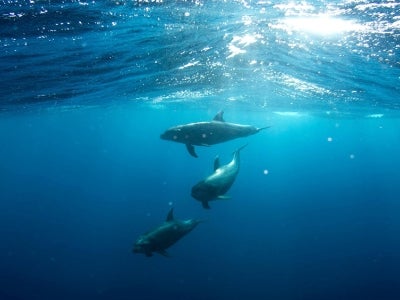Jointly issued by the GEF and UNDP
Washington, Dec. 4, 2015 - Oceans provide over US$1 trillion annually to the world economy in market goods and services and many times that in non-market amenities. Yet, our oceans are under growing threat from unsustainable practices, including over-fishing, land-based sources of pollution, invasive species and habitat destruction compounded by global climate change.
The science-based management and governance of shared transboundary marine ecosystems is the focus of a wide-ranging collection of stories published in a new publication, From Coast to Coast: Celebrating 20 Years of Transboundary Management of Our Shared Oceans, launched today during Oceans Day, being held on the sidelines of the 21st session of the Conference of the Parties (COP 21) to the UN Framework Convention on Climate Change (UNFCCC) in Paris.
“Oceans are vital for regulating the climate, maintaining biodiversity and for global food security. More than three billion people depend on marine and coastal areas for their livelihood and subsistence,” said Naoko Ishii, CEO and Chairperson of the Global Environment Facility. “At a time when our oceans and the services they provide are under tremendous threat, this publication demonstrates that shared governance among nations is possible with benefits to people worldwide. The manner in which we treat the oceans over the next few decades will determine whether economies will be able to thrive well into the future,” she said.
The GEF, the largest investor in transboundary water cooperation, has financed over US$1.5B in grants to over 170 countries, which has leveraged an additional $7.B in co-financing. GEF initiatives have enhanced global and regional cooperation and led to improved ecosystem health, services and human wellbeing through stronger governance at regional, national and local levels. The GEF has supported 23 marine and coastal projects in which multiple countries collaborate on strategic, long-term ocean governance of transboundary resources.
From Coast to Coast showcases the GEF IW large marine ecosystem and coastal area management portfolio, particularly how it has contributed to: 1) improved global and regional cooperation (e.g. conventions, commissions) in addressing priority transboundary water issues; and 2) improved ecosystem health and services and human wellbeing by addressing particular trans-boundary concern and through improved governance at regional, national and local levels.
The publication highlights ocean successes from around the world, including:
- Establishment of the Benguela Current Commission, the world’s first intergovernmental, cross-sector large marine ecosystem commission, which is now fully financed by the three governments of Angola, Namibia and South Africa;
- Adoption of the Caribbean and North Brazil Shelf Large Marine Ecosystems Strategic Action Programme by 31 ministers from 22 different countries, which sets 10 year priority actions for shared ocean governance in the region; and,
- Adoption and implementation by 12 countries of the Sustainable Development Strategy for the Seas of East Asia, which fostered integrated coastal management for 14% of South East Asia’s 234,000 km coastline, benefiting over 146 million people.
“This publication highlights how GEF grant funding has been very effective in helping to transform key ocean sectors such as shipping, fisheries and coastal wastewater management, at global, regional and national scales, on a path towards sustainability. UNDP is proud to have several of its GEF International Waters programmes highlighted in this volume.” said Andrew Hudson, Head of the UNDP Water & Ocean Governance Programme.
A collaboration of the Global Environment Facility’s IW:LEARN project, implemented by the United Nations Development Programme, and the United Nations University’s Institute for Water, Environment and Health, the publication contains six chapters with results and innovations from over twenty GEF International Waters projects spanning a variety of investments on integrated coastal management, pollution reduction, sustainable fisheries, and safe shipping.
The Global Environment Facility was established on eve of the 1992 Rio Earth Summit, to help tackle our planet's most pressing environmental problems. Since then, the GEF has provided over $14.5 billion in grants and mobilized in excess of $75.4 billion in additional financing for more than 4,000 projects. The GEF has become an international partnership of 183 countries, international institutions, civil society organizations, and private sector to address global environmental issues.
The United Nations Development Programme has established itself as one of the leading international organizations supporting the improved governance of transboundary water bodies. As a GEF implementing agency, UNDP offers countries specialized technical services in relation to waters and oceans. UNDP manages portfolios on integrated water resources management; multi-country management of transboundary rivers, lakes and aquifers; multi-country LME management; and climate change adaptation. UNDP-GEF projects in the IW focal area aim to achieve a comprehensive, ecosystem-based approach to the sustainable management of international waters and to address both development and ecological needs at global, regional, national and local levels (i.e., GEF Small Grants Programme). In terms of implementing GEF IW projects, UNDP has consistently delivered results through a broad range of international transboundary water interventions including the high-level adoption of 17 SAPs (eight in LMEs), eight of which are currently being implemented.
GEF IW:LEARN is the GEF International Water focal area’s knowledge management mechanism, operating as the central hub of information sharing and capacity-strengthening for the GEF IW portfolio of projects since 2000. It promotes experience sharing and learning among IW projects and national officials, agencies, and partners. It is implemented jointly by the United Nations Development Programme and the United Nations Environment Programme.
UNU-INWEH the “UN Think Tank on Water”, focuses on capacity development through knowledge enhancement and research-policy bridging. UNU-INWEH managed the comprehensive IW:Science project, which reviewed the science and learning opportunities from 20 years of transboundary water projects that make up the IW portfolio.
For more information contact
Mish Hamid, IWLEARN, +43 676 415 0281; mish@iwlearn.org
Christian Hofer, GEF Communications, chofer@thegef.org
Andrew Hudson, Head, UNDP Water & Ocean Governance Programme, andrew.hudson@undp.org
Leah Karrer, GEF International Waters, lkarrer@thegef.org

